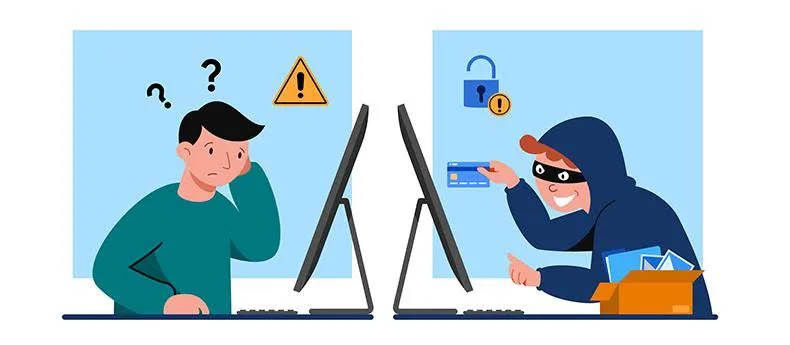In today’s digital world, meeting people online has become the norm — but so has deception. Catfishing is when someone creates a fake identity on social media or dating apps to trick others, usually for emotional manipulation, financial gain, or sometimes just entertainment. The scary part? Catfishers are often convincing. They know how to earn trust, mimic real lives, and avoid suspicion. But no matter how smooth they are, there are always signs if you look closely enough.
This article breaks down the telltale signs of a catfish, so you can protect your heart — and your identity.
1. Their photos look too perfect and reverse search reveals nothing:
If someone’s pictures seem like they’ve been ripped from a model’s Instagram or a stock photo website, that’s your first red flag. Most catfishers use attractive images to lure people in.
Look for:
- No candid or casual photos — all are glam shots.
- Pictures seem professionally taken.
- Reverse image search shows the same photos used under different names.
When someone has a flawless photo presence but a non-existent digital footprint, it’s worth investigating. Most real people leave traces online, even if minimal.
2. They avoid video calls or always have an excuse:
Catfishers know that face-to-face interaction can expose their lie — so they dodge it at all costs. If they’re always “busy,” camera doesn’t work,” or the “connection is bad,” it’s likely intentional.
Take note:
- They agree to video calls but cancel last minute.
- They might only agree to voice calls.
- Even during live chats, their camera mysteriously malfunctions.
Everyone has technical issues now and then. But if it becomes a consistent barrier, something is off.
3. Their social media is minimal, inconsistent, or recently made:
Genuine profiles show some history — old posts, tagged photos, interactions with friends. A catfish profile usually lacks that depth.
Key observations:
- Few followers, and most look like bots.

- Posts seem staged or generic.
- No engagement from friends or family.
Sometimes, the profile will appear polished on the surface, but digging a little deeper shows it lacks the natural messiness of a real online life.
4. Their stories don’t add up or keep changing:
Inconsistency is a major sign. When someone is lying, they often forget what they said before — or change details to fit the moment.
Things to watch for:
- They mention a job one day and a different one later.
- They give vague or conflicting answers about where they live or grew up.
- Their timeline seems unclear or jumpy.
While everyone gets things mixed up occasionally, repeated contradictions suggest they’re improvising — not being honest.
5. They fall in love or get overly emotional too fast:
Catfishers often rush emotional connections to hook you before you notice red flags. They’ll shower you with attention, affection, and even declarations of love early on.
Common tactics:
- They call you their “soulmate” after only days.
- They constantly talk about how different you are from others.
- They rely heavily on emotional language to build trust quickly.
This fast-paced emotional bonding is often a calculated move to draw you in before you think to question anything.
6. They ask for money, favors, or personal information:
One of the clearest signs of a catfish is when they start asking for financial help or sensitive information. They often have elaborate stories to back up their requests.
Look out for:
- Claims of being stuck abroad and needing emergency funds.
- Requests for phone cards, crypto, or online gift cards.

- Questions about your address, bank details, or passwords.
Even if they’ve built a strong emotional connection first, never share personal information or send money without proof of identity.
7. They won’t meet in person despite long Communication:
If months pass and there’s always an excuse to not meet up, that’s a major red flag. Catfishers avoid physical meetings to keep the fantasy alive.
Notice patterns like:
- They plan visits but cancel due to “emergencies.”
- They say they live nearby but never make an effort to meet.
- They’re always traveling or working abroad.
Someone genuinely interested will eventually want to meet. Reluctance to do so after regular contact is a warning sign.
8. Their responses are generic or seem copied and pasted:
Another clue is the way they communicate. Catfishers often talk in scripted ways or use common phrases that feel impersonal.
Watch for:
- Repetitive messages, especially overly romantic ones.
- Replies that don’t directly answer your questions.
- Strange grammar or phrases that don’t match the claimed location or background.
If the conversation feels robotic or disconnected, trust your gut — it may not be a real person.
Conclusion:
Being catfished can feel like betrayal, even if you never met the person in real life. But you’re not alone — it’s more common than you think. What matters most is spotting the signs early and trusting your instincts. The moment something doesn’t feel right — whether it’s too-perfect photos, constant video call excuses, or sudden declarations of love — take a step back and investigate. Online connection should never come at the cost of your trust or personal safety. Stay sharp, stay secure, and don’t let false charm blind you to the truth.
FAQs:
Stop sharing personal information, run a reverse image search, and ask for a video call. If they refuse, distance yourself.
Not always. Some do it for emotional manipulation, attention, or even entertainment. But financial scams are very common.
Meet in public, inform someone close, and never share sensitive details beforehand. Always trust your instincts.
Yes, often stolen from social media or modeling sites. That’s why reverse image searching is key.
While creating a fake identity isn’t always illegal, using it for fraud, scams, or harassment can lead to legal consequences.
